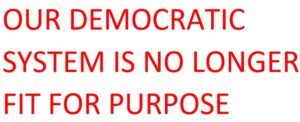 Britain’s system of democratic government is the result of a haphazard evolutionary process which started in the thirteenth century. It is the outcome of a wrestling contest for power between the king, nobles and tradesmen. Only in the nineteenth century was the electorate at all representative of the (male) population and even into the early twentieth century the nobility still had the power of veto over all legislation. There has never been a grand plan, nor any assessment of its efficacy. Never-the less Britain’s democracy was once the envy of the civilised world, it delivered the industrial revolution, the British Empire and health, safety and security for its citizens during and after the First and Second World Wars.
Britain’s system of democratic government is the result of a haphazard evolutionary process which started in the thirteenth century. It is the outcome of a wrestling contest for power between the king, nobles and tradesmen. Only in the nineteenth century was the electorate at all representative of the (male) population and even into the early twentieth century the nobility still had the power of veto over all legislation. There has never been a grand plan, nor any assessment of its efficacy. Never-the less Britain’s democracy was once the envy of the civilised world, it delivered the industrial revolution, the British Empire and health, safety and security for its citizens during and after the First and Second World Wars.
Since the Suez crisis in the 1950s, Britain’s power and influence has declined enormously. Britain’s democratic system is no longer delivering world leadership. The nation is drifting and has lost its sense of direction and purpose. Where once it was forward looking, it now wallows in nostalgia and past glories
Much of the problem is due to the way the democratic system now works. There are huge inherent problems with leadership selection, vision, rational decision making and excessive external influences which are neither being recognised nor addressed.
Consider leadership. The competence of our leaders appears to be in decline. This decline can be traced back to changes in the selection process; leaders are now chosen largely by party members rather than by MPs or Trades Unions. Party members now represent a very small proportion of the population and their views tend to be atypically extreme. In the last general election, as a result of this biased selection process, we voters had to choose between a habitual liar, Boris Johnson, and a man with his ideas drawn from the 1950’s, Jeremy Corbyn. Before that we had Teresa May a leader whose communication skills were so poor, she was known as the Maybot. We now have Liz Truss as our Prime Minister. She appears to live in a parallel universe, one in which all problems are solved by reducing taxes and increasing the National Debt. To be elected she has only had to appeal to members of the Conservative party; they are few in number and mostly aged, with little time for fresh ideas. How can we call this democracy?
The complexities of governance that our leaders face today are many times more challenging than when the current routines of Parliament were first defined two centuries ago. We desperately need experienced ministers who can provide leadership to both understand and confront the challenges facing us as a society. In business, candidates for job vacancies without a relevant track record would have little chance of success. In the UK, ministers are often catapulted into managing government departments for which they have no practical knowledge. As a result, they often act in an amateur knee-jerk fashion responding to each crisis as it occurs. Education and the National Health Service, in particular, have suffered greatly with ministers micro-managing according to their own pet ideas. A life in politics requires quite different skills from managing large institutions. Surely, we need to select leaders on their proven ability in office? We need leaders of our education systems, transport infrastructure, tax collection systems, health care and indeed our prime misters who can use their own expertise to construct world-class cost-effective institutions. Institutions that have planning horizons beyond the lifetime of a parliament and are capable of guiding Britain into the 21st century.
